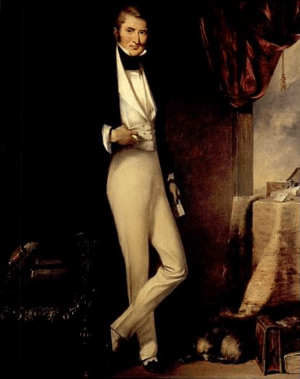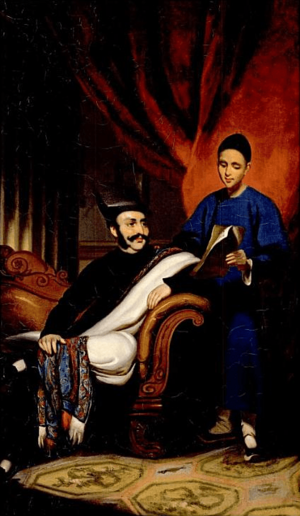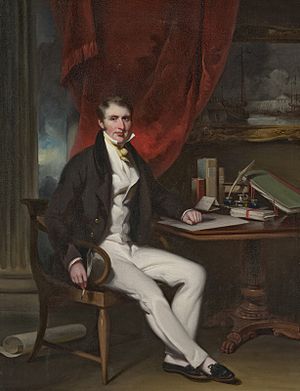William Jardine (merchant) facts for kids

William Jardine (born February 24, 1784 – died February 27, 1843) was a Scottish doctor and businessman. He helped start a very important company in Hong Kong called Jardine, Matheson & Co. After returning to England, he became a Member of Parliament (MP) for Ashburton from 1841 to 1843, representing the Whig party.
William Jardine studied medicine at the University of Edinburgh. In 1802, he received a special diploma from the Royal College of Surgeons of Edinburgh. The next year, he became a surgeon's assistant on a ship called the Brunswick. This ship belonged to the East India Company and sailed to India. In May 1817, he decided to leave medicine and focus on trade.
Jardine lived in China from 1820 to 1839. He quickly became successful in Canton as a business agent. In 1825, he became a partner in a company called Magniac & Co. By 1826, he was in charge of their operations in Canton. Later, James Matheson joined him, and in 1832, their company became Jardine, Matheson & Co.
In 1839, a Chinese official named Imperial Commissioner Lin Zexu ordered the destruction of many cases of a product called opium that British traders had brought into China. Jardine then traveled to London in September to ask the British Foreign Secretary, Lord Palmerston, to respond strongly to this event.
Contents
Early Life and Career
William Jardine was born in 1784 on a small farm in Scotland. He was one of seven children. His father passed away when William was only nine years old. This made things financially difficult for his family.
However, his older brother, David, helped him by providing money for school. In 1800, William started studying medicine at the University of Edinburgh Medical School. He learned about anatomy, medical practices, and other important subjects. While studying, he also worked as an apprentice to a surgeon. This gave him practical experience in a hospital.
On March 2, 1802, he graduated from medical school. He then received a full diploma from the Royal College of Surgeons of Edinburgh. At 19, he decided to work for the British East India Company. In 1803, he joined the ship Brunswick as a surgeon's mate. During his 14 years as a surgeon, he also traded goods like cassia, cochineal, and musk. This helped him become successful in business.
William Jardine left the East India Company in 1817. This allowed him to focus on trading a product called opium. The East India Company did not transport opium themselves. Instead, they hired other traders to do it. Jardine partnered with Thomas Weeding, another former surgeon, and Framji Cowasji Banaji, who traded opium and cotton. Their company did very well. This helped Jardine become known as a skilled and reliable private trader.
One of Jardine's business partners in Bombay was Jamsetjee Jejeebhoy. He was a Parsee trader who dealt in opium and cotton. Both men had been on the Brunswick ship together. Jejeebhoy remained a close business friend of Jardine for many years. A portrait of Jejeebhoy even hung in Jardines' Hong Kong office as a tribute to their friendship.

In 1824, a big chance came for Jardine. Magniac & Co., a very successful trading company in Canton, was having problems. Hollingworth Magniac, who had taken over the company, wanted to leave Asia. He was looking for good partners to join his firm. Magniac invited Jardine to join in 1825. Three years later, James Matheson also joined the partnership.
Magniac returned to England in the late 1820s. He left the company in the hands of Jardine and Matheson. Unlike other partners who would take their money out, Magniac left his money with the company. The firm continued to be called Magniac & Co. until 1832. This was because the name Magniac was still well-known in China and India.
Jardine, Matheson & Co.

James Matheson joined Magniac & Co. in 1827. He had been a partner in another firm before. Matheson was a perfect partner for Jardine. Their partnership was officially announced on January 1, 1828. Jardine was known as the planner and tough negotiator for the company. Matheson was the organizer. He handled the company's letters and legal matters. Matheson was also known for many new ideas in the company.
The two men were quite different. Jardine was tall and serious. Matheson was shorter and more cheerful. Matheson came from a wealthy family, while Jardine came from a more humble background. Jardine was very focused on business and worked long hours. Matheson enjoyed the arts and was very good with words. William C. Hunter, who wrote about them, said Jardine was a man of "great strength of character and unbounded generosity." He described Matheson as a man of "great suavity of manner and the impersonation of benevolence."
However, both men were very similar in some ways. They were both hardworking and determined to succeed. They also regularly sent money home to their families in Scotland. They helped their nephews by giving them jobs in the company. When his older brother David passed away, Jardine set up a fund for David's wife. He also arranged for David's four sons to go to school. All four of David's sons later worked for Jardine, Matheson & Co. in Hong Kong and South China. They started as clerks and eventually became partners.
The company's success came from their honest business practices, new management ideas, and strict financial rules. This was important because businesses at that time faced many challenges. Jardine was known for being very proud and strong-willed. Locals nicknamed him "The Iron-headed Old Rat" after he was hit on the head in Guangzhou. He simply brushed off the injury. In his office, he only had one chair, which was his own. Visitors were not allowed to sit. This showed them that Jardine was a very busy man.
Jardine was also good at handling problems. In 1822, he visited the company's Guangzhou office. He found that the employees were very unhappy with the managers. Jardine took temporary control and fixed the problems in just a few days.
On July 1, 1832, Jardine, Matheson & Co. was officially formed in China. Jardine and Matheson were the main partners. The company was given the Chinese name 'Ewo' (怡和), which means "Happy Harmony." This name was chosen because a respected Chinese merchant had used it for his business before.
The company did many types of business. They traded opium from India into China. They also traded spices and sugar with the Philippines. They exported Chinese tea and silk to England. They helped with cargo insurance and rented out storage space. They also provided money for trade and many other services.
In 1834, the British Parliament ended the East India Company's special right to trade between Britain and China. Jardine, Matheson & Co. used this chance to become even bigger. Their ship, the Sarah, was the first independent trading ship to arrive in England after the monopoly ended. It carried raw silk. Jardine Matheson then became the largest British trading company in Asia. Other traders started calling William Jardine "Tai-pan" (大班). This is a Chinese title meaning 'Great Manager'.
Jardine wanted to expand the opium trade in China. In 1834, he worked with Lord Napier, a British official. They tried to talk with Chinese officials in Canton, but they were not successful. The Chinese Viceroy ordered the Canton offices to be blocked. Lord Napier and others were held hostage. Lord Napier was allowed to return to Macao, but he was very upset and humiliated. He died a few days later from a fever.
Jardine had good connections with Lord Napier and his family. He used this event to convince the British government to use force. He wanted them to open up trade more in China. In early 1835, he told James Matheson to go to Britain. Matheson's job was to convince the government to take strong action. Matheson traveled widely in England. He met with many government and business people to get support for a war with China. At first, he was not successful. However, his efforts helped set the stage for a war a few years later.
Leaving China and Conflict
Matheson returned to China in 1836. He prepared to take over the company because Jardine was planning to retire. Jardine left Canton for Britain on January 26, 1839. While he said he was retiring, he actually planned to continue Matheson's work in England.
The Chinese government was happy to hear that Jardine had left. They were more familiar with Jardine as the main trading boss. They were less familiar with Matheson. So, they tried to stop the opium trade. Imperial Commissioner Lin Zexu ordered all opium to be handed over. He then had more than 20,000 cases of opium destroyed in Guangzhou. This was a huge amount. He also ordered the arrest of another opium trader, Lancelot Dent. Lin also wrote a letter to Queen Victoria, asking her to respect the Chinese Emperor.
War and Chinese Surrender
Jardine arrived in London in September 1839. His first goal was to meet with Lord Palmerston, the British Foreign Minister.
In 1839, Jardine successfully convinced Lord Palmerston to go to war with China. He gave Palmerston a detailed plan for the war. This plan included strategic maps, battle ideas, and how much money China should pay. It also listed the political demands from China and the number of troops and warships needed. This plan was known as the 'Jardine Paper'. In this paper, Jardine told Palmerston several key points. He wanted full payment for the 20,000 chests of opium that Lin had taken. He also wanted a good trade agreement to prevent future problems. He suggested opening more ports for trade, such as Fuzhou, Ningbo, Shanghai, and Keeson-chow. Jardine also thought that Hong Kong would be a perfect island to take over. It had a large, safe harbor. Jardine, Matheson & Co. and other companies had already used Hong Kong as a transfer point for ships since the mid-1830s. Jardine clearly stated what he believed would be enough naval and military power to achieve his goals. He also provided maps of the area.
Lord Palmerston, who became Foreign Secretary after Wellington, decided to go to war with China based mainly on Jardine's ideas. In mid-1840, a large fleet of warships arrived on the China coast. The First Opium War began. British warships destroyed many shore defenses and enemy ships. They attacked several coastal forts. They also bombed many towns and even moved north to threaten the Imperial Palace in Beijing. The Chinese government was forced to surrender. They agreed to the British demands.
In 1843, the Treaty of Nanking was signed by officials from Britain and China. This treaty allowed five major Chinese ports to open for trade. It also gave special rights to foreigners in China. China had to pay for the opium that was destroyed. The treaty also officially gave the island of Hong Kong to Britain. Hong Kong had been used as a trading and military base since January 26, 1841. Trade with China, especially in the product opium, grew. So did the company Jardine, Matheson & Co. It became known as the Princely Hong because it was the largest British trading company in East Asia.
By 1841, Jardine owned 19 large clipper ships. His main rival, Dent and Company, had 13. He also had hundreds of smaller ships and boats used for coastal trade. In 1841, Jardine was elected to the British House of Commons. He became a Whig Member of Parliament (MP) for Ashburton in Devon. He was also a partner in a banking firm. Even though he had officially retired, Jardine was still very active in business and politics. He built a large house in London and bought a country estate in Scotland.
Death and Legacy
In late 1842, William Jardine's health quickly got worse. He was suffering from a serious illness. By the end of the year, he was often in bed and in great pain. His nephew, Andrew Johnstone, and later James Matheson, helped him with his letters. Even though he was sick, Jardine still kept a close eye on business, politics, and current events. He continued to welcome visits from family, business partners, and political friends.
William Jardine passed away on February 27, 1843, just three days after his 59th birthday. He was one of the richest and most powerful men in Britain and a Member of Parliament. Many family members, friends, government officials, and business people attended his funeral. Many of them had been helped by Jardine during his life.
Jardine never married. He left his wealth to his brothers, sisters, and nephews. His nephews David, Joseph, Robert, and Andrew Jardine continued to help James Matheson run the company. Matheson retired in 1842. He handed over control of the company to his nephew, Sir Alexander Matheson.
Sir Robert Jardine (1825–1905) is an ancestor of one branch of the Jardine family. Another great-nephew of Jardine, William Keswick (1834–1912), became the company's Tai-pan from 1874 to 1886. He was responsible for opening the company's office in Japan in 1859. He also expanded the Shanghai office. James Matheson returned to England to take Jardine's place in Parliament. He also led the company's banking firm in London. In 1912, Jardine, Matheson & Co. bought out the shares of the Matheson family. However, the name "Matheson" is still part of the company's name today.
Over the years, many of Jardine's family members and their descendants managed the company. Today, the Jardine Matheson Group is still very active in Hong Kong. It is one of the largest groups of companies there and one of its biggest employers. Many places in Hong Kong are named after the company and its founders, Jardine and Matheson. These include Jardine's Bazaar, Jardine's Crescent, Jardine's Lookout, Yee Wo Street, Matheson Street, Jardine House, and the Noon Day Gun.
In 1947, a secret group was formed by family members. This group helped them keep control over the company. In 1961, Jardine, Matheson and Co. offered its shares to the public. Many people wanted to buy them. The company moved its main office to Bermuda in 1984.
The current Chairman of Jardine Matheson Holdings Ltd is Sir Henry Keswick. He was the company's Tai-pan from 1970 to 1975. His brother Simon was the company's Tai-pan from 1983 to 1988. Both brothers are the fourth generation of Keswicks to work in the company. The way Jardines is organized has changed a lot. However, members of Jardine's family still control the company through a complex system of shared ownership and a secret trust from 1947.
Notable Leaders
Some important leaders, known as Managing Directors or Tai-pans, of Jardine Matheson have included:
- Sir Alexander Matheson, 1st Baronet
- David Jardine
- Robert Jardine
- William Keswick
- James Johnstone Keswick
- Ben Beith
- David Landale
- Sir John Buchanan-Jardine
- Sir William Johnstone "Tony" Keswick
- Hugh Barton
- Sir Michael Herries
- Sir John Keswick
- Sir Henry Keswick
- Simon Keswick
- Alasdair Morrison
At one point in the early 1900s, the company had two 'Tai-pans' at the same time. One was in Hong Kong and one was in Shanghai. This helped them manage the company's many businesses in both places. These two leaders reported only to the senior partner in London. This person was usually a retired former 'Tai-pan' and an older member of the Jardine family.
Family Tree
See also
- Buchanan-Jardine baronets – a branch of the Jardine family from William's brother David Jardine.
 | James Van Der Zee |
 | Alma Thomas |
 | Ellis Wilson |
 | Margaret Taylor-Burroughs |

